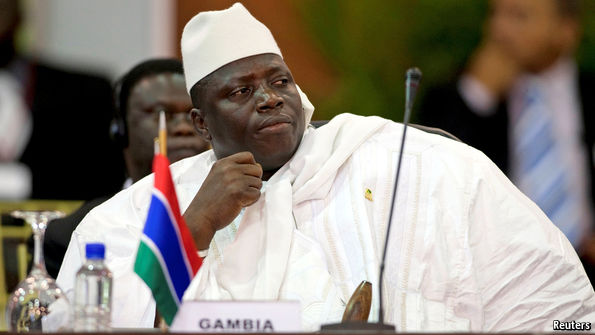
MOTORCADES are not an unusual feature of African political life. But a hush fell in Serekunda, Gambia’s largest town, as the presidents of Ghana, Liberia, Nigeria and Sierra Leone sped by in black Rolls-Royces. Gambians hoped the region’s other heads of state would persuade their own erratic president to step down. Yahya Jammeh, who has ruled the tiny West African nation for 22 years (and once said that, if Allah decreed it, he would continue for a billion), decided that, in fact, he wanted to remain in power despite unexpectedly losing an election two weeks ago.
Having gracefully conceded defeat and promised to step down after the votes were counted, he changed his mind and challenged the result, encouraged perhaps by the foolhardy pledges of some of the opposition to arrest him for his many abuses of human rights. The president-elect, Adama Barrow, refuses to say whether his government would prosecute Mr Jammeh.
The delegation of regional leaders, acting unusually firmly against a despot, nonetheless went home empty-handed. A deal “is not something that will happen in one day”, said Liberia’s weary-looking president, Ellen Johnson Sirleaf.
The inclusion of Ghana’s outgoing leader on the trip was no accident: John Mahama had conceded electoral defeat just three days earlier. There are no signs of him changing his mind, either—even after the victorious Nana Akufo-Addo promised a corruption probe.
Ghana’s peaceful vote was its seventh since the return of multiparty elections in 1992. Although the country’s democracy is far from perfect—politicians are wont to hand out rolls of banknotes hidden inside T-shirts at rallies and much of the country still votes along tribal lines—it is streets ahead of many others on the continent. Despite all the advantages of incumbency, Mr Mahama was ejected after just one term by voters fed up with how he had squandered Ghana’s new oil wealth and allowed the country to be blighted by double-digit inflation and a youth unemployment rate of almost 50%. And if Mr Akufo-Addo fails to deliver on promises like “one district, one factory”, voters are likely to punish him too.
In Gambia the vote was less about economics (although it too suffers from joblessness that prompts thousands of young people to take “the back way” to Europe) than it was a revolt against Mr Jammeh’s brutality. And fear of the mercurial dictator has yet to abate as he plots ways of clinging to the throne. Mr Jammeh has filed a petition with the Supreme Court, but it is not clear that it is even able to hear the case given that it has just one justice.
West African leaders still hope to hammer out a deal. But if diplomacy does not succeed by Gambia’s inauguration day on January 18th, military force is an option, an official of the Economic Community of West African States (ECOWAS) said. It is not clear that Gambia’s neighbours would, in fact, be willing to take tough action. But Gambia is casting a shadow over a region moving towards democracy: Senegal and Nigeria have experienced successful democratic transitions in recent years and Burkina Faso’s dictator was ousted after street protests in 2014. Asked whether he would return to Gambia again to mediate, Mr Mahama smiled: “I have my own transition to handle.”